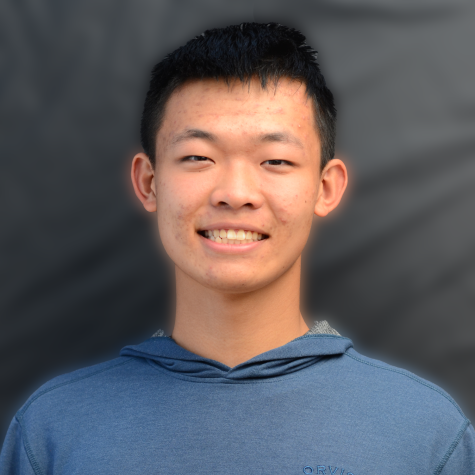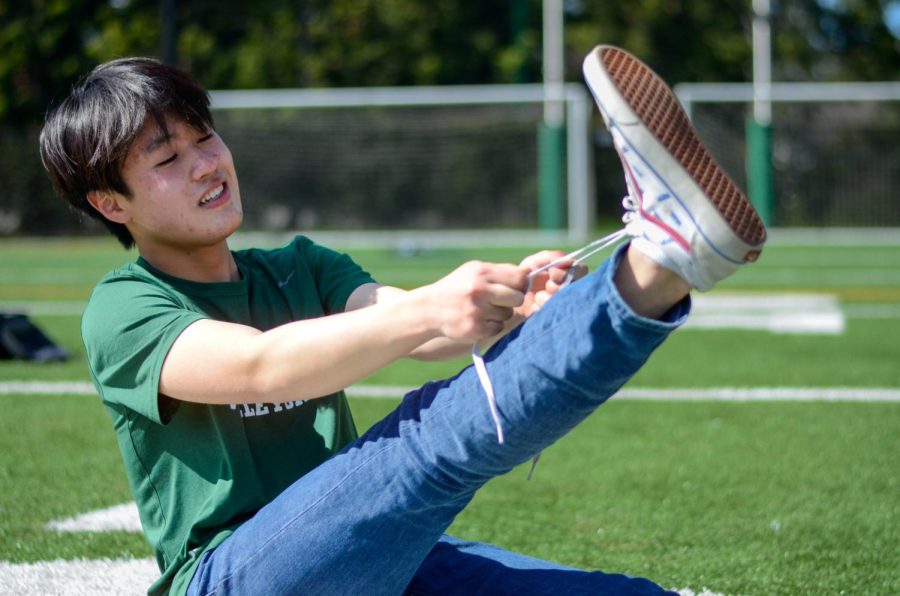Humans of Harker: Setting up for success
Raymond Xu sparks connections across volleyball and beyond
“A lot of times, sports is considered an escape from the classroom; however, at the same time, the mentality I developed in sports where I learned a balance of teamwork and competitiveness myself taught me that sometimes I need to fight for myself. Everyone has a gripe about something. Through computer science, I’ve been able to express my solutions to some of those problems,” Raymond Xu (12) said.
Pitter-patter, pitter-patter. The noise of Raymond Xu’s (12) Nike running trainers reverberate through his neighborhood as they bounce off the cement sidewalk. Moving in calculated and rhythmic steps, he leaps across each paved square and dodges the cracks on the ground’s surface.
Although Raymond runs with smooth and fluid steps, his life has been far from a planned-out and calculated journey. His adventurous spirit has led him on a path of self-exploration as he discovers the world around him.
“In high school, I started running on my own, and especially during quarantine, I found it engaging,” Raymond said. “Running’s not just a physical activity; it’s also mentally challenging, where some days, although I didn’t feel like running, I pushed myself to keep going and found different ways to motivate myself.”
To relieve his eyes from the constant use of laptops and to exercise regularly during the pandemic, Raymond began running with some of his friends, including senior Charles Ding. He spoke in Discord voice calls with them, and they occasionally ran together.
“I would always go running by myself [over quarantine], and my favorite memories of Raymond are when we would join in a voice call when we would run together,” Charles said. “It was really great since we could still be able to talk to each other.”
Although the pandemic opened doors to new opportunities, it also took some away. After playing both volleyball and soccer in middle school, Raymond was forced to choose only one because the two sports’ seasons overlapped. Volleyball’s focus on communication and coordination, which is what Raymond loves most about the sport, ultimately led to his decision.
“Every time we score a point in volleyball, everyone celebrates and high-fives, and I feel like that’s one aspect why I find volleyball unique,” Raymond said. “After a shanked ball or bad serve, there’s always people to cheer you on and keep you going. In that way, [volleyball’s] special to me because there’s a lot of communication of people’s true beliefs, which aren’t as negative as I may think.”
His teammates affirm his positive and supportive energy on the court, which translates to the moments of calm in his life off the court, whether it’s going on strolls with friends or having deep conversations about life.
“Initially I thought he was pretty quiet,” close friend Vishnu Kannan (12) said. “But, in 11th grade we [began to] play volleyball together, so that’s when we really started getting close. I got to know him better and he’s definitely not the quiet person I once thought he was. Once you get to know him, he really opens up.”
Although the dichotomy between sports and academics may be clear to some, such is far from the case for Raymond. In elementary school, he dreamed of using computer science to become a game designer. However, after discovering the practical applications of computer science in middle school, he realized that computer science wasn’t only about his own enjoyment, but more about how he could help others enjoy the same moments of joy he felt during his childhood.
“A lot of times, sports is considered an escape from the classroom; however, at the same time, the mentality I developed in sports where I learned a balance of teamwork and competitiveness myself taught me that sometimes I need to fight for myself,” Raymond said. “Everyone has a gripe about something; no one is happy with everything in the world. Through computer science, I’ve been able to express my solutions to some of those problems.”
Over the pandemic, he developed an application that used machine learning to determine the emotion and credibility of Twitter tweets and images. Additionally, Raymond and his siblings, William and Claire Xu (7), wrote a book titled, “Algorithmic Thinking for Adventurous Minds,” that focuses on efficiency and the steps to solving complex problems.
That care and understanding for others reflects in the classroom, which upper school computer science teacher Anu Datar, who taught Raymond in junior and senior years, noted.
“I can also see that he’s soft spoken, and he listens very carefully to others, so that’s also a rare talent these days,” Datar said. “Everybody likes hearing the sound of their own voices, so it’s hard to find people who actually listen. Raymond definitely has strength of character, because he has excellent judgment as well.”
All of these experiences through high school have influenced how Raymond sees the world and its challenges through various lenses.
“One thing I learned [through high school] is how to manage different situations and that I can push through anything,” Raymond said. “Although a lot of times I feel like I won’t get past an issue, I remember that I’m still here and nothing has completely put a stop [to what I’m doing].”
The difficulty in managing the aspects of his life have not held him back from being there for his friends, whether joking around with them or going on walks around campus.
“Although when you first meet him, he seems very quiet, you find out he’s the one that reaches out to you if you’re ever going through any trouble,” Charles said. “He always looks after the people around him.”
From his own personal experiences, Raymond shares that oftentimes, it can be healthier to simply take a step back and not be so hard on oneself.
“I’ve been through a lot of tough times and unhappy days where I felt that I couldn’t do something, but my friends are there to guide me along and tell me that everything is possible,” Raymond said.

Mark Hu (12) is the managing editor of The Winged Post. This is his fourth year on staff, and he previously served as the STEM editor and a staff reporter....


















![“[Building nerf blasters] became this outlet of creativity for me that hasn't been matched by anything else. The process [of] making a build complete to your desire is such a painstakingly difficult process, but I've had to learn from [the skills needed from] soldering to proper painting. There's so many different options for everything, if you think about it, it exists. The best part is [that] if it doesn't exist, you can build it yourself," Ishaan Parate said.](https://harkeraquila.com/wp-content/uploads/2022/08/DSC_8149-900x604.jpg)




![“When I came into high school, I was ready to be a follower. But DECA was a game changer for me. It helped me overcome my fear of public speaking, and it's played such a major role in who I've become today. To be able to successfully lead a chapter of 150 students, an officer team and be one of the upperclassmen I once really admired is something I'm [really] proud of,” Anvitha Tummala ('21) said.](https://harkeraquila.com/wp-content/uploads/2021/07/Screen-Shot-2021-07-25-at-9.50.05-AM-900x594.png)







![“I think getting up in the morning and having a sense of purpose [is exciting]. I think without a certain amount of drive, life is kind of obsolete and mundane, and I think having that every single day is what makes each day unique and kind of makes life exciting,” Neymika Jain (12) said.](https://harkeraquila.com/wp-content/uploads/2017/06/Screen-Shot-2017-06-03-at-4.54.16-PM.png)








![“My slogan is ‘slow feet, don’t eat, and I’m hungry.’ You need to run fast to get where you are–you aren't going to get those championships if you aren't fast,” Angel Cervantes (12) said. “I want to do well in school on my tests and in track and win championships for my team. I live by that, [and] I can do that anywhere: in the classroom or on the field.”](https://harkeraquila.com/wp-content/uploads/2018/06/DSC5146-900x601.jpg)
![“[Volleyball has] taught me how to fall correctly, and another thing it taught is that you don’t have to be the best at something to be good at it. If you just hit the ball in a smart way, then it still scores points and you’re good at it. You could be a background player and still make a much bigger impact on the team than you would think,” Anya Gert (’20) said.](https://harkeraquila.com/wp-content/uploads/2020/06/AnnaGert_JinTuan_HoHPhotoEdited-600x900.jpeg)

![“I'm not nearly there yet, but [my confidence has] definitely been getting better since I was pretty shy and timid coming into Harker my freshman year. I know that there's a lot of people that are really confident in what they do, and I really admire them. Everyone's so driven and that has really pushed me to kind of try to find my own place in high school and be more confident,” Alyssa Huang (’20) said.](https://harkeraquila.com/wp-content/uploads/2020/06/AlyssaHuang_EmilyChen_HoHPhoto-900x749.jpeg)



